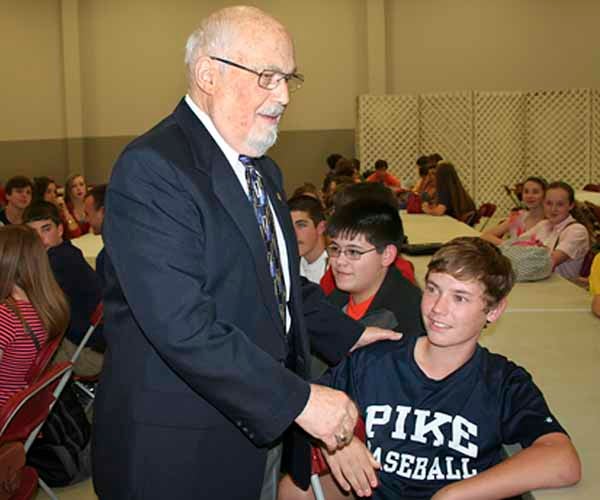Holocaust survivor shares his story with PLAS students
Published 11:00 pm Monday, April 8, 2013
Troy University’s “The Paperclip Project” planted a seed.

Max Herzel, a Holocaust survivor and lecturer visited the students at PLAS to share his story of survival.
“The Paperclip Project” was an opportunity for students to examine the Holocaust, which was the systematic, bureaucratic, state-sponsored persecution and mass murders by the Nazi regime.
The eighth-grade students at Pike Liberal Arts School wanted to know more.
Corrie Carroll, PLAS English teacher, recognized the teachable moment.
“After we participated in ‘The Paperclip Project,’ the students had so many questions,” Carroll said. “They were very interested and I thought the best way for them to learn about the Holocaust was to hear about it from a Holocaust survivor.”
On Monday, students at PLAS were able to hear the story of the Holocaust from Max Herzel, a Holocaust survivor and lecturer from the Birmingham Holocaust Education Center. Herzel is also a member of the Alabama Holocaust Commission.
He stressed to the students the importance of telling the story of the Holocaust.
“We must tell our story to be worthy of the memory of all those who perished in the Holocaust who cannot speak for themselves,” Herzel said. “We have a responsibility to tell the story to educate the public, especially the young people.
“Eleven million people died during the Holocaust. Six million were Jews and five million were Christians. We must honor and preserve their memory. We, the survivors, are the voice of the Holocaust.”
Herzel said he is committed to telling the story of the Holocaust for one reason.
“Most Holocaust survivors are about 80 years old. We will soon disappear and some of the evidence will be lost,” he said. “You young people here today are honored because you are the last generation that will be able to visit with a survivor of the Holocaust.”
Herzel told the students that the Holocaust did not begin with mass murder.
“It began with hate,” he said. “Out of ignorance and injustice. Hatred spreads like a cancer. And the way for evil to succeed is for people to do nothing about it.
“It is most important that if you firmly believe in what is right, speak up.”
Herzel said rumors were flying about the killing of the Jews but a notification of the atrocities lay on a desk in the State Department for 18 months before it was acknowledged.
He warned that today there are those who would have people believe that the Holocaust never happened.
“But President Eisenhower had pictures of the Nazi concentration and extermination camps taken and statements taken from witnesses because he said there will be those who say it never happened,” Herzel said.
But Herzel stood before the students at PLAS as a witness to the Holocaust.
He was born in Antwerp, Belgium in 1930. When the Germans invaded 10 year later, his family fled and took refuge in internment camps in Southern France.
His brother and father were placed in work camps.
Unable to handle the stress of her family’s plight, Herzel’s mother jumped into the river in attempted suicide and was placed in a psychiatric ward, an act that possibly saved her life.
Herzel was moved from one orphanage to another and, finally, placed on a remote mountain farm where he posed as a Catholic orphan. That placement possibly saved his life.
Herzel’s father was not so fortunate. He died in Auschwitz on Feb. 26, 1945 of malnutrition, heart failure and dysentery. He was 42 years old.
After the war, Herzel was reunited with his mother and brother. He migrated to the United States in 1948 and served in the United States Air Force.
Herzel gladly shares his knowledge of the Holocaust and his on personal story of survival. He is a voice of the Holocaust. He speaks for those who cannot speak for themselves.




